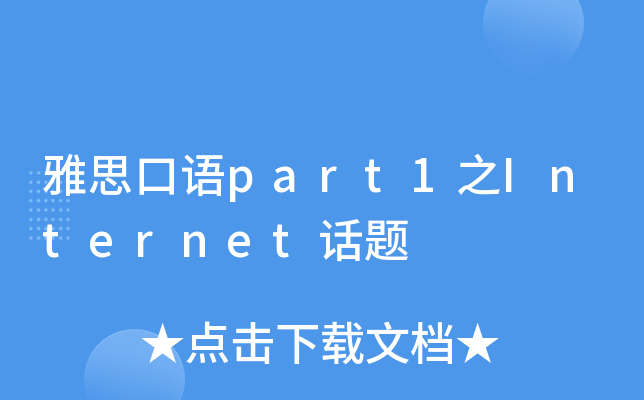
1.雅思口语part1之Internet话题
1.Do you often use the Internet?Yes, the Internet is great. I use the internet to keep up with current events. The Internet has a lot of quality news articles from many different sources. There is a world of knowledge right at your finger tips.
Yes, almost every day. I use the Internet for school research, email, and sometimes for map quest and news.
2. What do you use the Internet for most?
To check my emails, chat with my friends, go on YouTube and watch videos, play games online, search for photos and other stuff like that.
I guess everything, but for me the Internet is mainly about the people on it, meaning here is where my social life is.
I use the Internet to keep in touch with family members and friends. I use it with my job, I also use it to read the local and national news headlines, read my horoscope daily and to see what TV shows are worth watching tonight or tomorrow.
3. How did you learn how to use the Internet?
Everybody was always asking me for my email address, but I didn't have one. I went to a website a friend informed me of and created one. Friends kept telling me about different websites to check out. I tried them one by one and discovered that the web has unlimited uses. Finally, I found I was using the Internet almost everyday on my own.
4. How do you go onto the Internet?
I like to go out and use the Internet so I don’t feel like I am being lazy. I usually take my laptop to a coffee shop, ask the waitress for the password, and type it in. If I can’t go to a café, I just connect to the web at home.
5. What are the good and bad points about the Internet?
A good point is that there is a lot of free information. I can easily stay up to date with all that is happening in the world today. A bad point is that it is sometimes hard to decipher between what is fact and what is opinion. One must make sure that the information he or she is receiving is from a reliable source.
6. Do you think the use of the Internet needs to be controlled?
Yes, I do. There are a lot of mischief makers in the world that can use the Internet to do evil things. There are hackers that break into people’s computers by use of the Internet with the intent of stealing. Hackers also like to break into government or business sites to disrupt their operations.
2.雅思口语之家乡话题
P2 describe the changes in your hometown (what was the change, from where you noticed it, describe the change in detail)
P3 what is the difference between things which children play with in the past and now?
What is the difference between the ideas of modern people and old people?
What are the differences between old and new life styles?
What are their entertainment ways?
How could you relax yourself?
Some people think it’s important to protect the old lifestyles, what do you think?
What kind of people should be respected?
What is the relationship between the increasing population and the changes in cities?
How do the cities change?
Will local people tell the government these changes?
What does the government ask people to do? What about in the village?
Is there any new governmental policy?
Should the government listen to local people's opinions?
What facilities are necessary in cities?
How do the changes in cities affect local people?
Think about a facility which is good for the city development.
Are there many accidents in your cities?
How could you relax yourself?
3.雅思口语的万能模板
如果考生选择错误的分类方法,恐怕答案会非常幼稚,甚至可笑。所以考生需要做的就是在短时间内构思出几个方面,从而将问题展开。下面通过两个题目来讲述这种方法的应用。
a. Is it necessary to learn a foreign language?
这个题目的回答有很多种方法。
考生首先可以根据考生未来的工作来进行分类。
如果以后要从事关于外贸行业有关的工作,那么英语的学习就变得非常重要。因为在外贸行业,与外国人的交流就变得非常的频繁,并且要求也非常高。所以,外语对于生意的谈成就起到了至关重要的作用。其他行业比如说运输,物流,酒店行业等,这些行业也需要与外界交流,所以英语也很有必要。
但是,对于工程,化工,设计等技术行业来说,英语并没有起到很大的作用。所以,主要是行业起到了主导和决定性的作用。但是,我们的世界越来越受全球化的影响,所以学好外语可能对我们未来来说意味着更大的平台。
b. Is one-child policy in China considered a good law?
运用同样的方法,分情况来看。
首先可以从当时的效果来看,计划生育是一个非常好的政策。因为它很好的解决了当时的人口过剩问题,让每个人都能够享受到足够的资源。比如说它解决了温饱问题,教育资源匮乏问题以及别的问题,所以可以说是非常成功的。
但是,从后期的影响来说,这并不能完全算作一个好的法律。因为正是因为这个原因,它造成了人口老龄化。我们可以看到因为one-child policy,老年人的比例上升的非常快,这会进一步造成劳动力减少,进而导致经济发展滞后。
4.雅思口语的体育词汇
instructor 教练,技术指导
guide 领队
trainer 助理教练
referee, umpire (网球.棒球)裁判
linesman, touch judge (橄榄球)裁判
contestant, competitor, player 运动员
professional 职业运动员
amateur 业余运动员,爱好者
enthusiast, fan 迷,爱好者
favourite 可望取胜者 (美作:favorite)
outsider 无取胜希望者
championship 冠军赛,锦标赛
champion 冠军
record 纪录
record holder 纪录创造者
ace 网球赛中的一分
Olympic Games, Olympics 奥林匹克运动会
Winter Olympics 冬季奥林匹克运动会
Universiade 世界大学生运动会
stadium 运动场
track 跑道
ring 圈
ground, field 场地
pitch (足球、橄榄球)场地
court 网球场
team, side 队
5.雅思口语的教育词汇
instruction, education 教育
culture 文化
primary education 初等教育
secondary education 中等教育
higher education 高等教育
the three R's 读、写、算
school year 学年
term, trimester 学季
semester 学期
school day 教学日
school holidays 假期
curriculum 课程
subject 学科
discipline 纪律
timetable 课程表
class, lesson 课
homework 家庭作业
exercise 练习
dictation 听写
spelling mistake 拼写错误
(short) course 短训班
seminar 研讨班
playtime, break 课间,休息
course (of study) 学业
student body 学生(总称)
classmate, schoolmate 同学
pupil 小学生
student 大学生
schoolboy 男生
schoolgirl 女生
auditor 旁听生
swot, grind 用功的学生
old boy 老生
grant, scholarship, fellowship 奖学金
holder of a grant, scholar, fellow 奖学金获得者
school uniform 校服
teaching staff 教育工作者(总称)
teachers 教师(总称)
primary school teacher 小学老师
teacher lecturer 大学老师
professor 教授
schooling 教授,授课
assistant 助教
deputy headmaster, deputy head 副校长
rector 校长
dean 教务长
laboratory assistant, lab assistant 实验员


